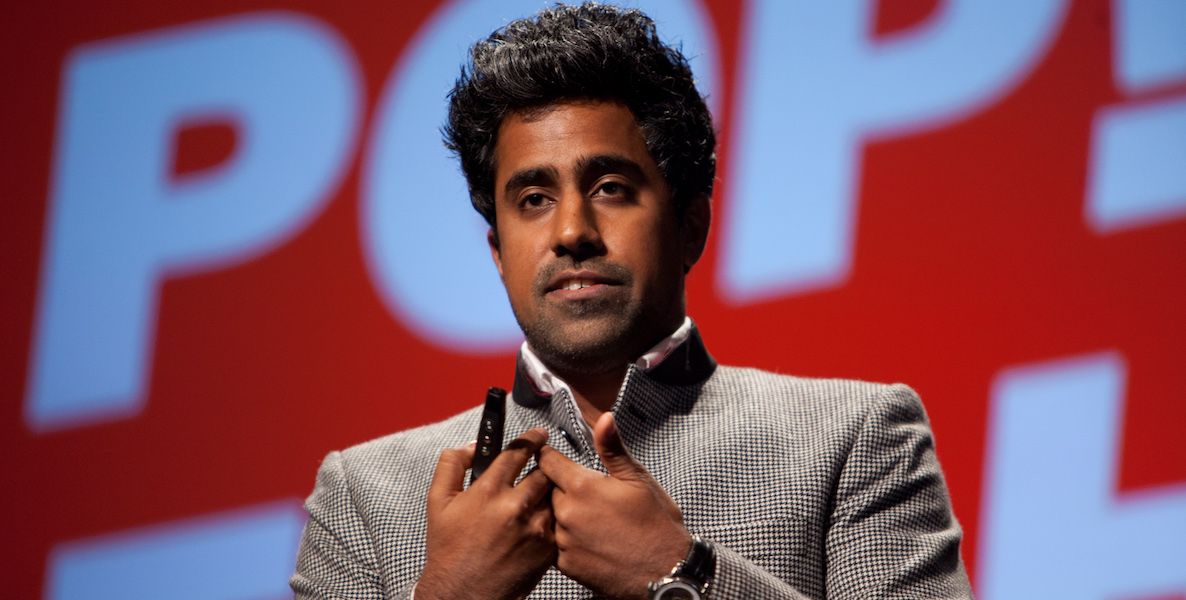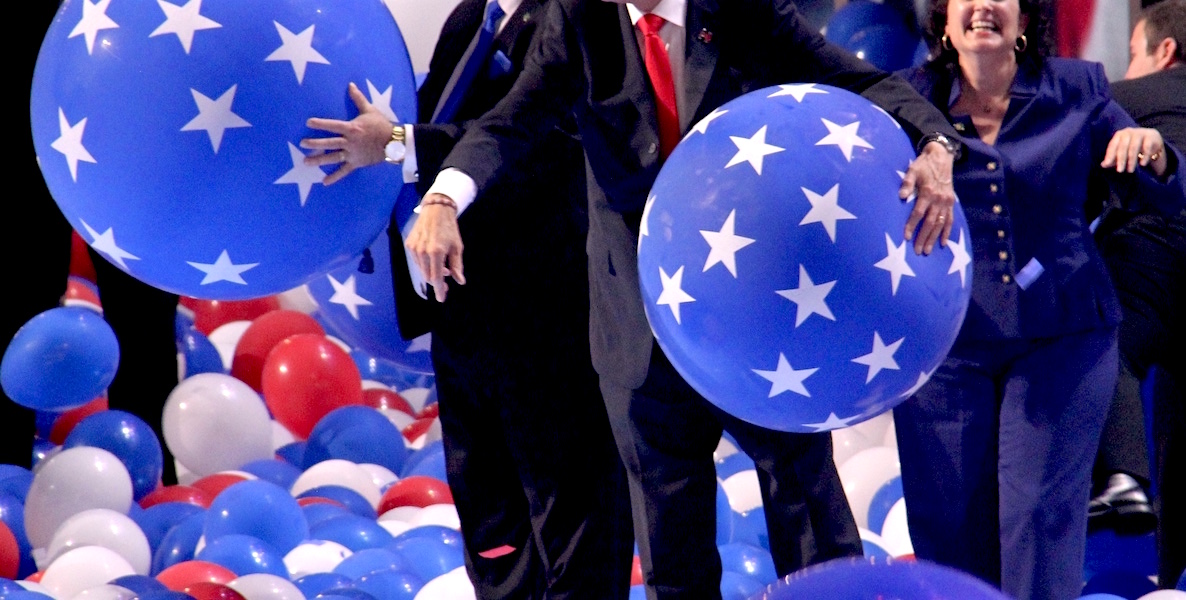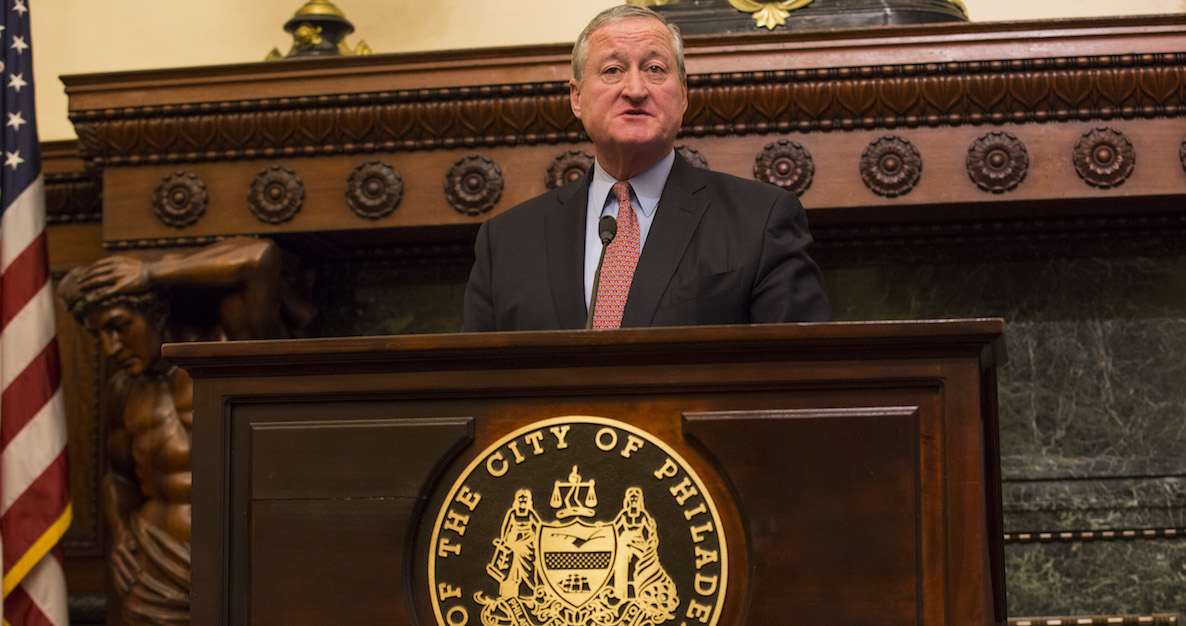In the last week, former City Controller Alan Butkovitz announced his intention to challenge Mayor Jim Kenney in next year’s primary, and State Senator Tony Williams—felled by Kenney in 2015—said he’s also deciding whether to jump in, though he already sounds like a candidate.
Simultaneously, in recent weeks, there has been polling in the field testing the name recognition and popularity of Jeff Brown, the entrepreneurial grocer who has brought fresh food and healthy lifestyle choices to Philadelphia’s food deserts, and who has been an outspoken critic of the anti-progressive effects of Kenney’s beverage tax.
The background to all this is, of course, that in Philadelphia, incumbent mayors don’t fend off serious challenges. No incumbent mayor in modern Philadelphia history who has run for reelection has been defeated. We once had a mayor who infamously bombed a neighborhood in his own city, and he got reelected. In 2011, when Michael Nutter sought reelection, the only candidate to emerge from that season’s whispering and jockeying was Milton Street, the colorful, outspoken former pol who had done prison time. (Street exceeded expectations by getting 25 percent of the vote on election day.)
So, history tells us that, chances are, we’ll be having a Kenney second term. But if turnout continues to escalate and the zeitgeist’s widespread appetite for change doesn’t dissipate, who knows? At the very least, it’s refreshing to hear that, in this famously uncompetitive political town—Moscow on the Delaware—some credible candidates are emerging. Because, no matter who the mayor is, we need an open and honest debate about a vision for the city.
At the very least, it’s refreshing to hear that, in this famously uncompetitive political town—Moscow on the Delaware—some credible candidates are emerging. Because, no matter who the mayor is, we need an open and honest debate about a vision for the city.
That’s what’s been missing from Kenney, any larger sense of where he sees Philadelphia in, say, five years, with goals and timetables laid out to get us there. In fact, that’s what was missing in our last mayoral election, which Kenney won by skillfully holding together a diverse coalition of interest groups and by mouthing New York Mayor Bill DeBlasio-tested progressive slogans—while being the labor candidate of choice.
I care less about who runs next year and more about having a real citywide discussion about where we’re going. But it won’t be enough to just run against Kenney. Anyone looking to unseat him has to also offer an affirmative case for a better Philadelphia.
How politically vulnerable is Kenney? Well, twice he’s spent political capital endorsing other candidates, and both times his candidate was roundly rejected. First, there was his endorsement of Steven Zappala in the Attorney General’s race, seen as payback to labor leader John Dougherty, his prime backer. Then, earlier this year, the Mayor blanketed the TV airwaves with ads for his hand-picked congressional candidate, Rich Lazer, his former right hand man and another Dougherty acolyte. When the congressional map was redrawn by the State Supreme Court, Lazer’s district was split between South Philly and Delaware County. That meant that, to win, Lazer would have to take about 70 percent of South Philly. In the end, he didn’t come close to that and finished well behind Delco candidate, and newly elected Congresswoman, Mary Gay Scanlon.
![]()
South Philly is Kenney country, no? It’s where he grew up, where his father was a firefighter, where he delivered the morning Inquirer, where he marched in the Mummer’s Parade. South Philly should be his base. Yet, candidates who were knocking on doors in South Philly last May say they were surprisingly confronted by opposition to the Mayor’s policies. Among the complaints: the soda tax, the out-of-nowhere property reassessments, the moving of the Rizzo statue, not to mention the mayor’s support for sanctuary cities and his visit to Meek Mill in prison.
Jim Kenney was elected mayor in 2015 after very skillfully putting together a strikingly diverse coalition. He appealed to white working class ethnics as Jimmy From The Block, the one-time Mummer who called Chris Christie a “fat ass” on Twitter for being a Dallas Cowboys fan. With Johnny Doc by his side—and having his back—he was the labor candidate. But he added to that calling card with significant African American support from the likes of former Councilwoman Marian Tasco and State Rep. Dwight Evans. And then he added to that by taking a page out of DeBlasio’s playbook and speaking the language of urbanist, progressive Philly.
Can he keep that fragile coalition together again? It’s not clear, for example, who might be Butkovitz’s natural constituency, which is no doubt why, in his announcement, he tried to exploit fissures among Kenney’s supporters, as when he critiqued Kenney for not ending stop and frisk policing, as promised.
![]()
I caught up with Williams on Wednesday night, and, like Butkovitz, he lays out the critique: Kenney hasn’t made a dent in the poverty rate—in fact, median household income in Philly, alone among big cities, is down; murders—primarily of African Americans—are up 4 percent this year after a 15 percent surge last year; Kenney still hasn’t been able to find the missing millions or hold anyone accountable for $924 million in accounting errors under his watch; Kenney has increased taxes by 17 percent, without a commensurate increase in job growth. Just what kind of return on investment are we getting for this incessant taxation of an already-constricted tax base?
It’s easy to be a critic, of course. I’m eager to hear ideas that can move Philly forward.
Williams sounded eager, too, when I spoke to him Wednesday night. Many of us were disappointed in his 2015 mayoral campaign. As a state senator, we’d long known him to be a thoughtful policy guy. His campaign, though, seemed lackluster and unfocused, not driven by ideas. He attributes that to being too cautious, afraid to make a mistake, scared to lose.
Opposing Kenney means not just providing an alternative to his policies, but also projecting a different style. Kenney often wears a sad sack expression and will tell just about anyone who will listen how much he dislikes his job. A credible challenger will have to be a happy warrior whose love for Philly—and its people—shines through.
“That was a missed opportunity by me,” Williams told me. “I didn’t speak the way I normally speak. Candid.” In a 15 minute conversation, Williams returned again and again to the big challenges: Poverty, tax policy that can fuel economic growth, and violence on our streets.
“We are long overdue for a real debate in this city on what matters,” he told me. Williams, Butkovitz and anyone else contemplating running will have to grapple with the authenticity challenge. Opposing Kenney means not just providing an alternative to his policies, but also projecting a different style. Kenney often wears a sad sack expression and will tell just about anyone who will listen how much he dislikes his job. A credible challenger will have to be a happy warrior whose love for Philly—and its people—shines through.
Are there others who might take the plunge? Most think that Councilman Alan Domb will wait for 2023 to run. Ditto Helen Gym. The wild card is Brown, whose entry into a mayoral race could be a game changer because of his big personality, and because he could likely self-fund. Brown is someone with entrepreneurial spirit and with real credibility in neighborhoods, having serviced food deserts and hired the formerly incarcerated at his stores.
Most importantly, he gives off that happy warrior air: He’s a back slapper and a high-fiver, as comfortable on the street as with the elite. Brown did not return my call seeking to explore his interest in running, but I wouldn’t hold my breath. When I’ve talked to him about it in the past, it seemed like family concerns would hold him back from doing anything beyond criticizing the Mayor—who he’s supported in the past—for his tax-happy ways.
And what of Kenney? It’s three years in, and his rhetoric about lessons learned from not winning the Amazon bid sounds encouraging, until you think…Hmmm. Where is your bold economic development plan? I was at a private dinner roughly a year ago with some local CEOs and Commerce Director Harold Epps, in which Epps said he was working on a groundbreaking pro-growth plan. I’m still awaiting its rollout.
This is a plea for Kenney to answer his critics with vision and substance of his own, rather than Trump-like personal attacks. I’m not optimistic on that front, however. In The Inquirer story about Butkovitz’s announcement, there was Kenney’s attack dog, Lauren Hitt, back at it: “Philadelphians want a progressive leader who will stand up to the rich and powerful—not a corporate Democrat running to help billionaire soda CEOs,” she said, suggesting that Butkovitz was nothing more than a pawn of the soda industry honchos who are angry at Kenney for taxing them.
Of course, questioning the motives of one’s political opponents—rather than answering their critique—is a page ripped right from the Trump playbook. But it’s what Kenney and Hitt do. It’s what they did to Brown—someone with impeccable progressive credentials—when he complained about the soda tax, ignoring the critical question: If a tax potentially forces the closing of a ShopRite that services an inner-city food desert, how exactly is that a progressive tax?
Come to think of it, the most healthy debate we can have ought to be oriented around that very question: Just what does it mean to be a progressive in Philadelphia today? Regardless of who the mayor is, the answer will say a lot about us and where we’re going. Who can paint a picture of a more fair, just and safe future for citizens who work hard and play by the rules? And who can show us a roadmap for how to get there? No matter who the candidates are, if we have an election next year that addresses those questions, we’ll have established a marketplace of ideas in our political life, and, for at least one shining cycle, maybe we’ll no longer be the People’s Republic of Philadelphia.
photo via Flickr




